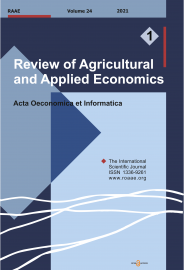KEYWORDS:
agricultural credit, access to credit, crop farmers, Enugu, probit regression
DOI NUMBER:
10.15414/raae.2020.23.02.03-11
ABSTRACT:
Rural and small holder famers in Nigeria and other developing countries have low capital base and poor access to finance. The inability of these farmers’ access to adequate credit has increased the problem of low efficiency in production. Inadequate credit supply is a major problem with which other production factors may exert negative influence on farmers’ output and efficiency. In ascertaining the sources and accessibility of credit by crop farmers in Enugu-Ezike in Enugu State, Nigeria, the sources of credit to farmers, the socio-economic characteristics of crop farmers’ that have access to credit, access to credit constraints and possible ways of improving farmers’ access to credit were investigated. Primary data collected through the administration of questionnaire were analysed using descriptive statistics and probit regression. Results showed that most crop farmers obtained credit mainly for farming and have accessed credit through informal sources, with friends and relatives being the most popular source. Majority of the farmers, who obtained information about credit through phone calls agreed that there were no delays in loan approval. Although, probit regression revealed that the independent variables (gender, age, marital status, education, household size, farm size, membership of cooperatives and farming experience) were not significant in jointly affecting access to credit at all probability levels, however, membership of cooperatives had an individually negative significant relationship with access to credit at the 10% (p<0.10) level. Recommendations that will improve access to credit include: increasing farmers’ access to information; reducing loan acquisition rigidity; reducing interest rate; having bank account; establishment of community and agricultural banks in the rural areas with simple procedures for securing loans; and the mobilization of farmers into groups to maximize the benefit of collective investment or group savings.
Please Cite this Article as:
Ikenna Charles UKWUABA, Zechariahs Benapugha OWUTUAMOR, Cynthia C. OGBU (2020) Assessment Of Agricultural Credit Sources And Accessibility In Nigeria. Review of Agricultural and Applied Economics. XXIII (Number 2, 2020): 3-11. doi: 10.15414/raae.2020.23.02.03-11
URL for sharing:
https://roaae.org/1336-9261/doi/abs/10.15414/raae.2020.23.02.03-11
FULL TEXT PDF:
▼ direct download link| view online in fullscreen ▲

